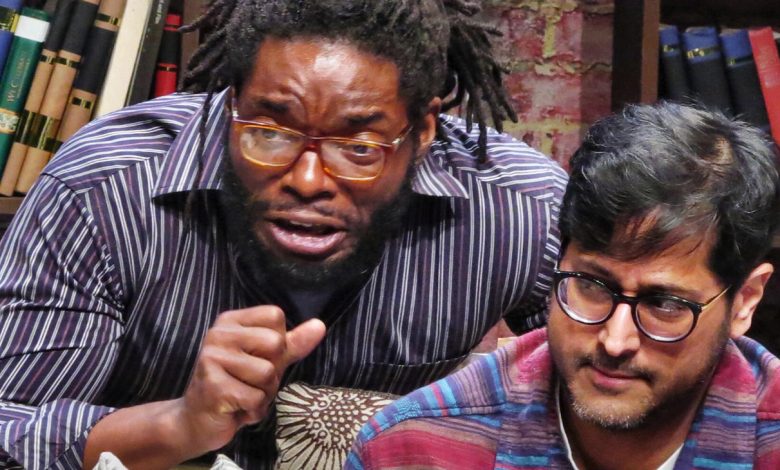COMMENTARY: Note From New York As Reed’s “The Conductor” Completes Off-Broadway Run

By Emil Guillermo
Oakland resident Ishmael Reed’s 11th play, “The Conductor,” came to a close last week in New York.
If “The Conductor” never plays again, I will have been privileged to be part of its evolution from Zoom readings from a year ago to two full off-Broadway runs in 2023. That’s six weeks of live shows, 24 shows in all.
But wouldn’t it be nice to have the show satirizing the Bay Area’s race politics actually have a run in the Bay Area?
That would make it a homecoming of sorts for Kenya Wilson, who spent her early years in the Bay Area, the daughter of two members of the Black Panther Party, Walter and Tracy Wilson.
One of the perks of doing the show is being part of such a great group of actors. None of the cast members are household names yet. All are working, paid, professional actors still pursuing their dreams.
Wilson was part of a cast that included Brian Anthony Simmons as Warren Chipp, a fired SF Bay Area columnist; Sri Chilukuri as Shashi Parmar, an Indian American activist in the San Francisco school board recall; Monisha Shiva as Kala Parmar, a lecturer in women’s studies at a local college; Laura Robards and me as conservative television commentators Hedda Duckbill and Gabriel Noitallde.
A play about a diverse America should have a diverse cast, including understudies Joy Renee, Humzah Akbar, and Aaron Watkins.
I should note, Reed has cast me, a Filipino American, in all of the white roles (voice over only).
And then there was Wilson, who played reporter Melody Wells, fitting because Reed has subtitled the play “A Living Newspaper” after a 1930s WPA project where artists and writers took the subtext of the news into the theater to create informative and provocative works that took its cues from society as it unfolded.
And that adds to the significance of Wilson’s role in the play as a Black woman journalist. Not only does she get to spout the poetic literary lines of Reed, but she also gets to lay out factual information on Black women that makes audiences see her as their champion.
As an actress, Wilson admits she only knew about some of the powerful things she was given in Reed’s writing. She knew about the now-deceased writers Bell Hooks, Ntozake Shange, and Toni Morrison. But she also realized how politicized the education system is in America, as to who gets taught what ideas, and what ideas are simply ignored.
Black women, generally, are ignored.
“When it comes to Black women, we are on the bottom of the totem pole,” Wilson said. “I feel when we voice our experiences people don’t want to hear it, and they just assume that we’re all just complaining.”
In her one big scene, Wilson is not complaining but rather making the case for Black women.
“For instance … unintended pregnancies for African American women are 19 times higher than those of white women,” Wilson said. So are chlamydia and gonorrhea infection rates, as well as rates of cervical cancer and breast cancer. “And all of these things are reproductive and sexual in nature. And it just takes me back to times when my ancestors were enslaved, and we were there to breed for more slaves,” Wilson said. “And it’s not a coincidence to me that we have a higher chance of dying in childbirth. None of this is a surprise to me because this is a country that doesn’t care about Black people.”
Wilson’s key scene is a “debate” with an Indian American woman about the plight of Dalits, or lower caste “untouchable” women. Wilson always wins the audience back when, after the hearing about the plight of Dalits, Wilson responds, “Being a Black woman is no lottery prize.”
It’s a line that should also win back critics of Reed from years past who saw him as somehow anti-feminist.
“Definitely not this play,” said Wilson, who has already appeared in multiple productions this year, and is scheduled to appear in another play in Philadelphia. After a 14-year respite from acting, she’s been back at it the last six years and hopes to be on Broadway soon.
But she would definitely welcome a part in the further evolution of “The Conductor.”
Reed’s dubbing the play a “living newspaper,” is instructive. That may be the conceit that keeps “The Conductor” alive, with new iterations written by Reed and performed by a stable cast in real time, telling the story of America’s changing racial politics.
But would that be on some grassroots stage in the Bay Area? Or digitally via podcast or as radio drama?
Oakland resident Ishmael Reed’s “The Conductor” has closed off-Broadway for now, but its future is wide open.
Emil Guillermo is a journalist and commentator. His one-man theater performance, “Emil Amok, Lost NPR Host: A Phool’s Filipino American History,” runs on Sept. 14 @930pm Eastern in New York this week.





